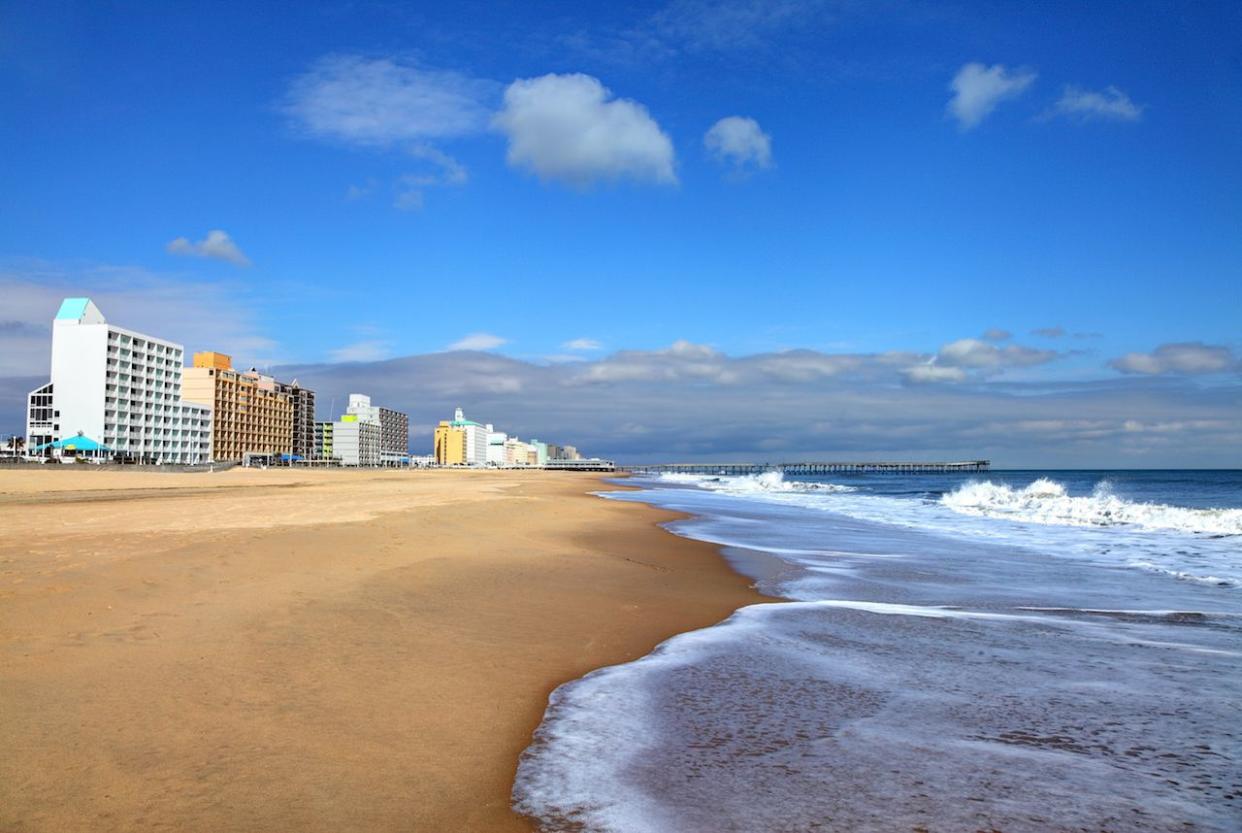5 Things Everyone Wishes Their Boss Did

Being your own boss is amazing, but if you have employees, it’s important to keep their happiness and wellbeing top of mind as well. A team that feels appreciated, supported, and heard is a team that’s likely to stay engaged long-term, and that means less turnover, fewer hiring expenses, and better morale overall.
Kevin Wong, co-founder of Lunar Hard Seltzer, has put in the time and effort to build a growing, thriving team. Check out his secrets to hiring and retaining incredible employees in this episode of Mind The Business: Small Business Success Stories, then listen to the full episode below.
1. Take time to know what you want, before you hire
Hiring the right fit is important, but before that rec hits the job board, think through your business needs. For Wong, that process begins with reflection and getting to the root of the problem. “You're either solving a need because you need more, or you're solving a need because you need better,” he says.
So how do you know what you need? “First, you start off by journaling,” he explains. “What did I do this week? And then you kind of group those [things] and be like, what are tasks that fit into a role? Where do I need help?” If you’re struggling to define a role, try writing out a job rec for it. “Writing it helps you think through who and what you need to hire for,” he says.
2. When hiring, go for the go-getters
“We have this thing — a line on our careers page that says, ‘Feel free to invent your own role.’ And we're inviting people to pitch themselves to us,” says Wong.
It’s a strategy that’s worked well for Lunar Hard Seltzer. People who like the company and feel strongly about forging their own path reply with reasons they should be hired — sometimes pointing out pain points Wong and his business partner haven’t considered. “And that has been so awesome, because there are these awesome go-getters out there that are going to reach out [and] pitch us,” he says.
The result? More enthusiastic hires who aren’t afraid of thinking creatively and taking initiative.
3. Do the work to set the tone
Lunar Hard Seltzer has two owners: Wong and his co-founder, Sean Ro. The two began their relationship as friends and have since had to navigate the joys and challenges of being business partners as well.
As co-owners, Wong and Ro know very well that their words, actions, and interactions set the tone for the entire company. It’s a responsibility they take seriously.
“We actually made a commitment to each other that we would go to couples therapy,” says Wong. Therapy has helped them learn how to invest time in their relationship beyond work which, as Wong describes it, can be ”all-consuming.” They take time to be intentional about how they check in on each other — a habit that’s helped them form a healthy foundation for their personal and professional relationship.
4. Take time to show appreciation
When you’re focused on business growth, it’s easy to overlook everyday victories. You might take for granted yesterday’s accomplishments, but doing so leaves your team feeling undervalued.
“The most important thing is showing appreciation,” says Wong. At Lunar Hard Seltzer, one way team members convey appreciation is through giving snaps, which they do weekly at their all-hands meeting. “It's really about making sure that everyone feels included, feels valued, that we're taking time to appreciate each other,” he explains. “There's so many things that happen in any given week.” Taking a moment to let people give public kudos ensures that no one’s contribution is overlooked.
5. When it comes to benefits, put yourself in their shoes
“It's so simple to say, but there's a weight to that decision, right?” It’s the first thing Wong thinks about when it comes to HR and employee benefits: his responsibility for his team’s care. He understands that providing quality benefits, and helping his team understand exactly what’s offered — is an integral part of his job as a leader. “All of a sudden, their livelihood — their income — is now resting on you as a business owner. It's on your shoulders.”
As a result, Wong and his business partner have spent a considerable amount of time contemplating and crafting their benefits packages. “I barely understood PPO … when I just worked at someone else's company. But all of a sudden, I was like, wow. My co-founder and I spent a whole weekend just reading [and trying to understand] what does this mean? What would I want? What would I want when I was younger? What do I want now?”
After the first year, Wong and his partner asked their team for feedback, then acted on that feedback to improve their benefits for the following year. “Before you commit to something so large, just know that it's your employee's wellbeing. It's a human's wellbeing. It's their livelihood. For a whole year. So make sure you treat that with the respect that it needs,” he advises.
Kevin Wong and Sean Ro aren’t just pioneers in modern hard seltzer. They’re successful business owners who’ve grown their two-man team into one that actively hires in multiple cities. Check out the full story in episode 6 of the Mind the Business podcast.
This article originally appeared on QuickBooks and was syndicated by MediaFeed.org.
More from MediaFeed:
You Won't Pay Taxes on Social Security Benefits if You Retire in These States

Thinking about where to retire and how to make your retirement savings last? You're not alone, and you've got some major considerations to weigh. If retiring early is on your wish list, choosing the right location might be one of the smartest money moves you can make.
Now, working out how much you'll get from your assets, pensions, and Social Security isn't too daunting. But figuring out how state taxes will nibble away at that income? That's a whole different game. It calls for some serious research or a chat with a tax advisor who's clued up on all 50 states. And here's the kicker — not every state taxes Social Security benefits. Opting for a high-tax state could turn your dream retirement into a financial headache.
Your local CPA or tax advisor might be a whiz in your home state, but the rules elsewhere could be a complete mystery. So here's a helpful guide to the states where you can dodge paying state tax on Social Security benefits.
But keep in mind, this isn't a one-size-fits-all situation. You might still get a tax break on Social Security benefits in an unlisted state, depending on your unique financial picture. So if you don't spot your ideal retirement spot, don't panic! A professional can help you stretch those retirement dollars.
And don't forget, Social Security taxes are just one piece of the puzzle. There might be other state-specific taxes that need your attention. So buckle up, dive into the details, and set yourself up for a rewarding retirement in a location that won't break the bank.
Alessandro Biascioli / iStock
Thinking of retiring in Alabama, or maybe moving there a bit earlier? Here's some good news: Alabama's got a state income tax, but they give Social Security benefits a pass. That's right, you won't be handing over any of your Social Security cash to the taxman.
Now, let's talk about income tax in Alabama. It's got that marginal structure we see with federal taxes. The rates are pretty friendly, starting at a low 2% and capping off at 5%. Just keep in mind, that's not the whole story – some local areas might toss in their own income taxes.
And while we're on the subject of taxes, let's dive into sales tax. Alabama's state sales tax rate is a cool 4%, but don't get too comfortable. Some local spots can heap on some extra sales taxes, pushing the total rate over 9% in some places.
But here's a silver lining: Property taxes in Alabama are some of the lowest around. So whether it's a retirement haven or just a new chapter, Alabama's tax landscape is something to explore.
DepositPhotos.com
Got your sights on Alaska, the Last Frontier? Here's a look at what awaits you tax-wise, and it's pretty sweet! First off, no state income tax. Yep, you heard that right – and that means your Social Security benefits stay in your pocket, untouched by Alaska's tax hands.
But wait, there's more! Alaska doesn't have a state sales tax either. Sure, some local areas might charge a bit, but it's a mere trifle, averaging just a smidge under 2%. Talk about easy on the wallet!
As for property taxes, they're right around the middle of the pack for the nation, so no big surprises there.
But here's the cherry on top: If you call Alaska home, you might just get a yearly check from the state's permanent fund dividend. How cool is that?
So if you've got a thing for cold weather, nature, and a more low-key, less populated vibe, Alaska's calling your name.
Chilkoot/istockphoto
Thinking about retiring under the Arizona sun? You'll love this: Arizona's tax system gives Social Security benefits a free pass. That's right, your federally taxable Social Security income doesn't get touched by the state – it's all yours, tax-free.
Now, let's say you decide to move to Arizona a bit before retirement or want to make some extra bucks after. You'll find the state's income tax rates pleasantly mild, ranging from 2.59% to 4.5%. It's set up as a marginal income tax system, so it's pretty straightforward.
On the sales tax front, Arizona's state-level rate is 5.6%, but the local areas might tack on a little less than 3%. So, not too shabby there either!
Property taxes? You're in luck again. They're on the lower side compared to the rest of the U.S., so you can keep a bit more cash in your pocket.
And here's a bonus feature of Arizona living: the climate! With a warm and dry atmosphere, many retirees find it a comfortable and inviting place to call home. So, whether it's the taxes or the temperature, Arizona's got a lot to offer.
DepositPhotos.com
Thinking about Arkansas for your retirement? Here's something to put a smile on your face: Arkansas won't lay a finger on your Social Security benefits, as they aren't part of the state's taxable income calculations. Yep, they're all yours to enjoy.
But what if you're not quite ready to retire, or you're planning to earn some extra income in Arkansas? You'll be looking at state income tax rates that range from a low 2% up to 6.6%. It's all set up on a marginal income tax system, so it's pretty easy to get your head around.
Now, let's talk shopping. Arkansas has a state sales tax of 6.5%, but you'll want to keep an eye out for the localities that might add almost another 3% on average. It's something to bear in mind.
On the property tax front, Arkansas offers a pleasant surprise: they're below the national average. So you might find your dream home without a hefty tax bill attached.
All in all, Arkansas has a lot of appeal, especially when it comes to taxes and retirement planning.
istockphoto
Thinking about spending your golden years in California? Good news! Despite the reputation for having a handful of state-level taxes, your Social Security benefits are safe from the state income tax in the Golden State. That's right; you can keep all those benefits to yourself.
If you're still in the working world or looking to earn a bit on the side, California's marginal income tax will be something to keep in mind. It's a sliding scale, ranging from 1% to a whopping 13.3%, depending on your earnings. And don't forget, some localities may add a little extra income tax on top.
Now, about shopping in California: The state sales tax is 7.25%, and you might find localities adding around 1.5% or so to that. It's not insignificant, but hey, retail therapy, right?
Property taxes? Actually, not as bad as you might think. They're below the national average, which might be a pleasant surprise given California's reputation for high living costs.
Speaking of living in California, many people fall in love with the place, and who can blame them? From the fantastic weather in some areas to the endless opportunities for fun and relaxation, it's a dream for many. But heads up, the housing prices can be on the steep side.
So if you're eyeing California for retirement, just weigh the pros and cons. With no tax on Social Security benefits and some great lifestyle perks, it's definitely a place to consider!
DepositPhotos.com
Thinking about settling down in Delaware for your retirement? Well, you're in luck, especially if you're eyeing those Social Security benefits. In Delaware, your Social Security isn't touched by state income tax. Nope, not a cent. So that's a win right there!
Now, if you've got some income coming in aside from Social Security, Delaware's income tax will apply to you. But it's on a sliding scale, from 0% (yup, zero!) all the way up to 6.6%, depending on what you're earning. And keep in mind, some local areas might have their own income taxes to consider.
But here's something to get excited about: Delaware doesn't charge any state or local sales taxes. Whether you're splurging on a new wardrobe or grabbing the essentials, you won't see a sales tax on that receipt.
And if you're looking at buying property, Delaware's property taxes might just put a smile on your face. They're some of the lowest in the nation. So, whether you're planning to downsize or find that dream retirement home, your tax bill won't break the bank.
All in all, Delaware's looking pretty good for retirees, with plenty of tax advantages to enjoy.
mdgmorris
Considering retirement in the heart of the nation, Washington, D.C.? Here's a fun fact for you: The District of Columbia won't take a bite out of your Social Security benefits with its income tax. That's right, those benefits are all yours, untouched by state taxes.
But if you're still working or have other income, be prepared for D.C.'s income tax. It works on a sliding scale, starting at 4% and going up to 8.95%, depending on how much you make.
Now, when it comes to shopping in the capital, you'll be hit with a 6% sales tax. But don't worry, there are no local add-ons to that, so what you see is what you get.
Thinking about buying a place? You'll be pleased to hear that D.C.'s property taxes are among the lowest in the country. That might make investing in a home or condo a little more appealing!
And let's not forget about all the amazing things to see and do in Washington, D.C. From strolling around the National Mall to exploring the free Smithsonian museums, you'll never run out of exciting activities. Retiring in the District might just be the vibrant, tax-friendly adventure you've been looking for!
DepositPhotos.com
Thinking about retiring to the Sunshine State? Florida might just be the perfect fit for you, especially if you like keeping your money where it belongs - in your pocket! Yep, Florida has no state income tax, so you can say goodbye to paying taxes on your Social Security benefits.
But hold on, there's a little more to consider. While you'll save on income tax, don't forget about sales tax. In Florida, it's set at 6%, with local areas adding a bit more, usually just over 1%. So, if you're planning a shopping spree, keep that in mind.
Property taxes? They're right around the national average, so nothing too shocking there.
Now, let's talk weather. Florida's warm climate is a huge draw for retirees, offering endless sunshine and beautiful beaches. But heads up, hurricane season can stir things up a bit, so be prepared for that possibility.
All in all, Florida's mix of tax advantages and tropical vibes might be just the ticket for your golden years.
Elisa.rolle
Planning a move to Georgia, perhaps? If you're looking to retire in the Peach State, here's some juicy info for you. First up, your Social Security benefits? They're tax-free! Georgia's got your back and won't touch those federal Social Security dollars.
Now, let's dig into other taxes. Georgia operates on a marginal income tax system, with rates ranging from a sweet 1% to 5.75%. It's not zero, but it's not too shabby either.
Sales tax? You're looking at 4% on the state level, but local towns and cities might add a little more than 3% on top of that. So, be prepared to pay a bit more at the checkout when shopping in some of those southern boutiques.
Property taxes are in line with the national average, so no big surprises there.
All in all, Georgia offers a fair tax deal and your Social Security benefits get VIP treatment. Pair that with some delicious traditional cuisine, and you might have found your perfect retirement spot!
DepositPhotos.com
Thinking about saying "Aloha" to retirement in Hawaii? Well, here's a tropical tidbit for you: Hawaii doesn't touch your Social Security benefits when it comes to state taxes. Those benefits are all yours to enjoy under the Hawaiian sun.
But let's surf through some other financial waves you'll want to know about. Hawaii's marginal income tax system has a range as colorful as a luau, with rates as low as 1.4% and as high as 11%. It's something to consider if you've got other income coming in.
Sales tax is a cool 4% at the state level, and localities usually only sprinkle on less than .5% extra. That's pretty chill compared to other states.
And property taxes? Grab your surfboard, because you're riding a wave of savings with the lowest property taxes in the nation!
Now, it's not all palm trees and Mai Tais. Housing prices can be a big splash, making moving to Hawaii a bit of a financial plunge. But if the islands are calling you and you can navigate those costs, retirement in Hawaii might just be a beautiful sunset on the horizon.
Pixabay.com
Have you ever considered kicking back in the Gem State, otherwise known as Idaho? If you're a potato lover, you'll be right at home. But it's not just spuds that might attract you to Idaho; there's also a sparkling tax situation to consider.
Your Social Security benefits? In Idaho, they're treated like a precious gem and are exempt from state income taxes.
But wait, there's more! If you have other income to think about, Idaho's marginal tax rates range from a modest 1.13% to 6.93%. Not too shabby!
Shopping spree, anyone? The state sales tax is 6%, and local areas barely add anything to it. Feel free to load up on those famous potatoes.
What about property taxes? Well, those are sitting pretty below the national average. Maybe enough to save you some extra money for a fancy fishing rod or hiking gear to explore the great outdoors.
So, if you're pondering where to plant your retirement flag, Idaho's looking like a pretty tempting spot. Low taxes, beautiful landscapes, and yes, those tasty potatoes could make it just the right place for your golden years.
knowlesgallery
Thinking about retiring in the Land of Lincoln? Illinois could be a pretty cool option, especially when it comes to Social Security benefits. They don't tax them! That's right, all your Social Security income stays right in your pocket in Illinois. It's like a welcome gift from the Prairie State.
But hang on a second, let's talk about the rest of the taxes. The regular state income tax in Illinois doesn't mess around with brackets or anything complicated. Nope, it's just a flat 4.95% on all taxable income.
Now, let's move on to shopping. The state's sales tax rate is 6.25%. But don't forget about the local governments; they'll add a little less than 3% to that. It might pinch a bit, but hey, who can resist a good Chicago-style hot dog?
About property taxes, though, brace yourself: Illinois is pretty near the top of the list for highest property taxes in the country. It's like a tall Chicago skyscraper.
So, is Illinois the right spot for your retirement? You'll have to weigh those property taxes against the no-tax-on-Social-Security thing, and maybe even throw in a love for deep-dish pizza into the decision-making process.
IanDikhtiar
Indiana, the Hoosier State, could be calling your name for retirement, especially if you like the sound of not paying state income tax on your Social Security benefits. That's right, your Social Security money is safe from taxes in Indiana.
Now, let's chat about what else you need to know. Planning to earn some extra cash in retirement or moving there a bit early? Indiana keeps it simple with a flat 3.23% tax on taxable income. And while localities might add their own taxes, it shouldn't add up to much.
When it comes to shopping, Indiana's sales tax is a solid 7% across the board. No wild surprises from local areas adding on to that rate. And guess what? Property taxes are just a smidge below the national average.
Feeling the allure of four seasons without breaking the bank? Indiana's housing costs are on the friendlier side, and you'll have the chance to experience all that seasonal beauty.
So, if you're after a down-to-earth place with no Social Security tax, straightforward taxes, and a good ol' Midwestern feel, Indiana might just be the perfect spot to kick back and enjoy retirement.
DepositPhotos.com
Have you ever thought about Iowa for your golden years? If Social Security benefits are a big part of your retirement plan, you might want to give it some thought. Why? Iowa's got your back by not including Social Security in its taxable income calculations. That's right, no state taxes on those benefits!
Now, what else might you want to know about this Midwest gem? If you've got other income sources, Iowa plays with a marginal income tax system. Rates start as low as .33% and can climb up to 8.53%. Keep in mind, localities might have their income taxes too, so that's something to watch for.
When it comes to sales tax, Iowa keeps it pretty even-keeled at 6%, with local areas usually adding just a touch more, typically less than 1%. But if you're eyeing property, note that the property taxes are in the top 25% of the country. Not a deal-breaker, but worth considering.
All in all, Iowa might be a surprise contender for your retirement spot. With no taxes on Social Security benefits, a manageable sales tax, and a genuine heartland charm, it could be just the place to settle down and enjoy life at a more relaxed pace.
DepositPhotos.com
Thinking about retiring in Kentucky? Well, here's some good news for your pocketbook: the Bluegrass State won't hit your Social Security benefits with any taxes. That's right, Kentucky doesn't factor in Social Security benefits when it's crunching those taxable income numbers. And that means more of your hard-earned money stays with you!
Now, what else should you know about living it up in Kentucky? First off, if you've got other taxable income, the state's got a flat 5% income tax. Easy, right? But don't forget about local income taxes; some places might have them, so give it a quick check when you're planning.
Sales tax is a straight-up 6% across the state, and usually, localities don't tack on anything extra. As for property taxes, Kentucky's got you covered with rates a smidge below the national average.
So, whether you're dreaming of horse races, bourbon tours, or just enjoying a low-key retirement, Kentucky might be calling your name.
hstiver / istockphoto
Thinking about jazzing up your retirement years in Louisiana? Great news for Social Security beneficiaries - the Pelican State doesn't consider those benefits taxable income. That means you can enjoy your beignets and jambalaya without worrying about state taxes on your Social Security!
But let's talk a bit more about Louisiana's other taxes. The regular income tax system works on three marginal tax rates, with the lowest being 2% and the highest clocking in at 6%. Pretty straightforward, right?
Sales tax is where things get a little more spicy. The state rate is 4.45%, but local areas can bump that up by more than 5%. So, depending on where you're shopping, you could be looking at close to a 10% total sales tax.
However, Louisiana is easy on property owners, offering some of the lowest property taxes in the country. That's something to tap your feet about!
So if you're considering taking in the lively culture, rich history, and warm hospitality of Louisiana during your retirement, knowing these tax basics will help you plan better.
DenisTangneyJr
Planning to soak in the natural beauty of Maine in retirement? Well, here's some good news: Maine's state income tax doesn't touch Social Security benefits. That's right, you won't have to pay a dime of state income taxes on those funds. Lobster dinners, anyone?
Now, let's dive into the other taxes you might encounter. Maine's income tax isn't a flat sea; it's got waves, starting at 5.8% and cresting as high as 7.15%, depending on your income. But it's still relatively smooth sailing.
Sales tax? Maine keeps it simple with a flat 5.5% rate and no extra sales tax from localities. That's a refreshing breeze!
But hold onto your hats for property taxes - they're above average. So if you're planning to buy a home among the pines, factor that into your budget.
Maine's allure for nature-loving retirees is undeniable, with breathtaking landscapes and serene settings. Just be prepared for those long, harsh winters – they're as much a part of Maine as the stunning coastal views.
So grab your favorite flannel, pull on your boots, and get ready to explore the rugged charm of Maine in your golden years.
DepositPhotos.com
Thinking about enjoying the beautiful landscapes of Maryland during your retirement? Good news! Maryland's state income tax won't even glance at your Social Security benefits. That's a pretty sweet deal, right?
But hey, let's not stop there. Maryland's income tax system has a bit more going on. It’s like a menu with eight different options, starting as low as 2% and going up to 5.75%. Localities like to join the party too, adding their own local income taxes on top of the state rates. It's like a crab feast, but with taxes!
Sales tax in Maryland is like a good flatbread – simple and consistent at 6%. No local add-ons, no surprises. Just straightforward.
When it comes to property taxes, however, they sit slightly above average, kind of like the view from one of Maryland's lovely coastal spots.
Whether you're a crab enthusiast or a lover of the open bay, Maryland's financial landscape is something you can navigate with ease, knowing that your Social Security benefits are safe from taxation.
DepositPhotos.com
So, considering retirement in Massachusetts, the land of clam chowder and the Red Sox? Here's a handy guide to what you can expect on the tax front!
First things first, give yourself a high-five, because your Social Security benefits are untouchable here. Massachusetts' state income tax has a rule that keeps its hands off federally taxable Social Security income.
Now, what about the other stuff? Massachusetts likes to keep things simple with income tax. It's a flat 5% on all taxable income.
Sales tax? Another simple story. It's 6.25%, and localities don't usually pile anything on top of that. Shopping in Boston? The price you see is pretty much what you pay, plus that 6.25%, of course.
Property taxes are on the higher side, though, so you might want to factor that into your dream home planning.
Whether it's strolling along the Freedom Trail or taking in a game at Fenway Park, Massachusetts could be a great fit for your retirement. And hey, that Social Security benefit staying tax-free is like an extra bowl of clam chowder on a chilly Boston day!
Sean Pavone/istockphoto
Thinking about settling down in Michigan, home to the Great Lakes and Motor City? Here's what you'll want to know about taxes, especially if retirement is on the horizon.
First, the good news! Social Security benefits are like a cherry on top of Michigan's tax sundae — you don't pay state tax on them. That's right, Michigan keeps its hands off those benefits since they aren’t part of the state’s taxable income math.
Now, about other income taxes. Michigan likes to keep it simple. There's a flat rate of 4.25% on all taxable income. Watch out for localities though; some might ask for a bit more, so check your specific area.
Sales tax in Michigan? Another straight shooter at 6%. Localities typically don't tack on anything extra, so what you see is what you get.
One thing to note: property taxes are above average, so factor that in when scouting for your dream retirement cabin or city loft.
From fishing the lakes to touring the automotive museums, Michigan's friendly tax treatment of Social Security benefits might make it a perfect place for your next chapter.
DepositPhotos.com
Thinking about retiring in Mississippi? Well, you're in luck, especially when it comes to taxes and cost of living. Here's the lowdown on what to expect if you decide to call the Magnolia State your home.
First and foremost, let's talk about Social Security benefits. In Mississippi, those benefits are like a VIP guest at a party – they don’t get taxed. That's right, they aren’t considered taxable income in the state, so you can keep all of what you get.
Now, the rest of the income tax story. Mississippi's got a marginal income tax system. What does that mean? Well, it starts at a friendly 0% and only goes as high as 5%. Not too shabby!
Next up, sales tax. At 7%, Mississippi does have one of the higher state sales tax rates. But before you frown, know that localities pretty much leave it at that and don’t add anything extra. So, no surprises there.
And here's more good news: property taxes are chillin' way below the national average. Plus, overall, Mississippi is a bargain shopper's paradise with one of the lowest costs of living in the U.S.
So, whether you're dreaming of sweet tea on a sunlit porch or fishing in a serene river, Mississippi might just be the ideal spot for your retirement.
Greg Hurst / istockphoto
Nevada is not just for the gamblers and adventure-seekers, it's also a haven for retirees. Why? Well, let's dive into the details.
First off, if you're receiving Social Security benefits, Nevada's like, "Tax? What tax?" That's right, there's no state income tax, and that includes no tax on Social Security benefits. Keep those benefits, they're all yours!
Next up, sales tax. Nevada's state rate is 6.85%, and the localities toss in about an extra 1.5%. So, you might want to keep that in mind while shopping around for those cowboy boots or hitting the stores in Las Vegas.
Speaking of buying, if you're thinking of purchasing a place to settle down, Nevada's property taxes are hanging out below the national average. That's some more good news for your wallet.
But it's not all about money, is it? If you're the adventurous type, or maybe just enjoy good dining and shows, the Las Vegas area might just be your retirement playground. There's a lot to explore, even if rolling the dice at a casino isn't your thing.
Deposit Photos
Considering New Hampshire for your retirement? Well, there's some unique financial news coming your way from the Granite State that might just pique your interest.
First and foremost, Social Security benefits? They're totally tax-exempt. That's right, those benefits won't be nibbled at by the state's income tax.
But wait, there's more. New Hampshire has this really specific income tax thing going on. You'll only need to pay state income tax on dividend and interest income, and that's at a flat rate of just 5%. Other income? Not taxed at the state level.
Now, hold onto your hat for this one: Sales tax? Nope. Zip. Zero. Neither state nor local governments charge any sales taxes in New Hampshire. Talk about a shopper's paradise!
However, not everything is sunshine and rainbows. The property taxes in New Hampshire are like those breathtaking mountains they have - pretty high. In fact, they're some of the steepest in the country.
So, whether you're thinking of embracing the beautiful outdoors or enjoying the no-sales-tax shopping, New Hampshire has a lot to offer. Just be mindful of those property taxes, and you might find yourself loving life in this New England gem.
Pixabay.com
Thinking about retiring in New Jersey or just curious about the tax scene there? Well, let's break it down in a way that won't make your eyes glaze over.
First off, if you're collecting Social Security benefits, you're in luck. New Jersey doesn't include Social Security benefit income in their taxable income calculations, so that part of your income's safe and sound.
Now, other income you might have? That's where things get a little more colorful. New Jersey's got this sliding scale going on with their marginal tax rates. They start at a friendly 1.4% and can climb all the way up to 10.75% if you're in the high-income crowd. Oh, and some local places might toss in a little local income tax, too.
Sales tax in New Jersey? That's a solid 6.625% across the board. Not too wild, pretty standard.
But let's talk property taxes. If you're thinking of buying a home in New Jersey, sit down for this one: they've got the highest property taxes in the whole U.S. Yes, the highest.
So, New Jersey's kind of a mixed bag when it comes to taxes. Your Social Security's safe, the income tax has a range, sales tax is straightforward, but those property taxes? They're in a league of their own. If you love the Garden State, just be sure to factor that into your plans!
DepositPhotos.com
Thinking about retiring in New York? Good news! New York's state laws mean you won't pay state income tax on your federally taxable Social Security benefits. It's a sweet deal for retirees.
Now, if you're earning more income, keep in mind that New York's marginal tax rates range from a low 4% and can go up to 8.82% for the big earners out there. And don't forget those local income taxes - they're added on top of the state rates.
Shopping in the Empire State? The state sales tax is just 4%, but with localities tacking on an average of 4.5%, those purchases can add up.
And while we're on the topic of money, know that property taxes are a bit above the national average in New York. But hey, don't let the thought of New York City's high costs scare you away. There's a whole state out there with more affordable living options.
Whether it's the quiet countryside or a charming small town, New York has something for everyone.
DepositPhotos.com
Considering North Carolina for your next chapter in life? Here's some financial food for thought for retirees and side-hustlers alike. While you might have to pay a flat 5.25% state income tax on earnings from that part-time gig or your creative side hustle, you can breathe easy knowing your Social Security benefits won't be touched by state taxes in North Carolina.
And when it comes to spending that hard-earned money, the state sales tax sits at 4.75%, with local areas adding just a smidge under 2.25%. Feeling good so far?
There's more good news: Property taxes in North Carolina are just a touch below the national average. So whether you're launching a new business in retirement or just enjoying the laid-back life, North Carolina's tax scene is pretty friendly.

Thinking about making Ohio your home before or during retirement? Here's what you need to know about the financial landscape. Firstly, take a deep breath and relax, because Ohio doesn't touch your federally taxable Social Security benefits with state income taxes. So that's a win right off the bat! But wait, there's more to explore.
For those still in the workforce, Ohio's income tax is kinder than most, with marginal rates that start at a friendly 0% and only go up to 4.8%. Just keep an eye out for local income taxes, as they might be in play depending on where you settle.
Shopping in Ohio? You'll encounter a state sales tax rate of 5.75%, but local areas might add around 1.4% to your bill, so be prepared for that.
Now, here's the kicker: Ohio residents do pay some of the highest property taxes in the nation. It's something to consider when picking out that dream home or condo.
Whether you're seeking vibrant city life in Cleveland or Columbus, or tranquility among Ohio's beautiful landscapes, knowing the tax situation can help you plan wisely. Ohio might just be the place where your next chapter begins!
Pixabay.com
Considering a move to Oklahoma, especially during retirement? Well, here's a friendly heads-up about the financial landscape you'll find in the Sooner State. First off, your Social Security benefits are safe from the clutches of state income tax in Oklahoma. A relief, isn't it?
But let's dive a bit deeper into the state's taxation. If you have income outside of Social Security, Oklahoma applies six marginal tax rates, ranging from a mere .5% all the way up to 5%. Not too bad, right?
Now, what about shopping? Oklahoma's state sales tax sits at 4.5%. But don't be surprised if local areas add roughly another 4.5% to your bill.
Homebuying? Property taxes in Oklahoma are right around the national average, so you'll find no big surprises there.
Whether it's the vibrant culture, the love for football, or the beautiful landscapes that draw you to Oklahoma, knowing the tax situation can help you plan your move with confidence.
Sean Pavone // istockphoto
Thinking about retiring to the scenic landscapes of Oregon? Here's the lowdown on what the financial scene looks like in this beautiful northwestern state.
First things first: your Social Security benefits? Completely free from state income tax in Oregon. That's right! They don't include Social Security in the state's tax calculations. So, you can pocket that money with no worries.
Now, if you're still earning some income besides Social Security, Oregon's marginal income tax rates start at 5%, and for those in the top tier, it goes up to 9.9%. A bit steeper, but there's good news ahead.
Oregon has no sales taxes. None. Zero. Zip! Whether state or local, you won't find sales taxes here, so shop away.
Property taxes? Pretty much on par with the nation's average, so nothing too shocking there.
If you're an outdoorsy type or someone who enjoys arts, culture, and fantastic food, you might just fall in love with Oregon as your retirement destination.
DepositPhotos.com
Considering settling down in Pennsylvania after retirement? Here's what you need to know about the tax situation in the Keystone State, wrapped up in a friendly package.
First of all, take a deep breath and smile because Pennsylvania doesn't tax Social Security benefits. They're off the hook in the state's income tax calculations, so that's a little more in your pocket right there.
Next up, let's talk about income tax. In Pennsylvania, it's a flat rate of 3.07%. Pretty straightforward, but keep in mind that local governments might toss in a little extra, so make sure to check your specific location.
Moving on to sales tax, the state rate sits at a comfortable 6%. Most localities add just a sprinkle more to that, around .34% on average. It's a modest addition, so nothing too surprising there.
But here's where things might catch your attention: Property taxes in Pennsylvania are well above the national average. That's something to factor into your budget if you're eyeing that perfect cottage or bungalow in this history-rich state.
Overall, Pennsylvania's tax picture is fairly balanced, but it's that property tax that might make you pause and ponder. Either way, with its blend of urban experiences and rustic charm, Pennsylvania offers an appealing backdrop for retirement.
weaver1234
Thinking about spending your retirement years in South Carolina? Well, you're in for a treat! South Carolina's tax structure and scenic beauty make it an attractive destination for retirees, and here's why.
First off, let's talk Social Security benefits. In the Palmetto State, you can kick back and relax knowing that you won't have to pay state income taxes on those benefits. It's like a warm southern hug for your wallet!
But what about other income? South Carolina's marginal tax rates are a mixed bag, ranging from 0% (yes, zero!) to 7% depending on your taxable income. So, you might want to sit down with a sweet tea and crunch some numbers to see where you fit in.
Now, let's chat about sales tax. The state rate sits at 6%, and localities add roughly 1.5% to that. It's a fairly standard rate, nothing too shocking there.
But here's where South Carolina really shines - property taxes. They're some of the lowest in the country! Imagine the charming southern home you could settle into without breaking the bank.
And if that's not enough to make you start packing, let's talk about the location. South Carolina is far enough south to steer clear of those biting winters. Plus, it's a paradise for nature lovers. Fancy a quick beach getaway? You got it. In the mood to explore the mountains? They're within reach too.
In short, South Carolina offers a blend of tax benefits and natural beauty that could make your retirement years something special.
Joesboy
Looking for a tax-friendly state for your retirement? South Dakota just might be the place for you! In South Dakota, your Social Security benefits are safe from the taxman's reach, and there's some other good and surprising news when it comes to taxes.
South Dakota has a zero state income tax policy. This means that apart from your Social Security benefits, all your other income goes untaxed on the state level, too.
But wait, there's more. South Dakota's sales tax rate is a modest 4.5%, and even when localities add their bit (usually around 1.9%), it's still pretty low. Whether you're shopping for everyday essentials or splurging on something special, your wallet will thank you.
Hopefully you're not holding your breath, because South Dakota's property taxes are a bit above the national average. It's something to consider when you're hunting for that perfect retirement home. But with all the savings you're making on income and sales tax, it may be a sacrifice you're willing to make.
From the the Black Hills to the windswept plains, South Dakota offers a unique blend of rugged natural beauty and surprising tax benefits that could make it an ideal retirement destination.

Thinking about retiring in Tennessee? You're in for some good news on the tax front! Tennessee's state income tax, which only applied to interest and dividend income, is on its way out. And guess what? Social Security benefits aren't even part of the tax game in Tennessee, so you won't have to stress over paying taxes on those when you retire.
But here's the real kicker: A recent change means there's no state income tax on any income in Tennessee. Yes, you read that right – zero state income tax!
Now, let's talk about sales tax. The state rate is 7%, and local governments might add around 2.5% on top of that. While it might sound a bit high, the property taxes here are below average, which could balance things out for you.
But Tennessee isn't just about the numbers. With its rolling hills, majestic mountains, and lively cities like Nashville and Memphis, it offers a rich blend of natural beauty and cultural vibrancy.
With a relatively low cost of living, no state income tax, and the charm of varied terrain, this southern state could be the perfect stage for your retirement encore!
DepositPhotos.com
Want to say 'Howdy!' to retirement but taxes have you feeling like you're at a rodeo, then Texas might just be the place for you. In the great state of Texas, Social Security benefits aren't wrangled with taxes. Why, you ask? Because Texas doesn't have a state income tax at all! That's right, partner – no state income tax means more money in your boot.
But before you saddle up, there are a couple more things you should know. Sales tax in Texas stands at 6.25%, and local folks might add around another 2% to that. And while we're on the subject of taxes, it's fair to tell you that property taxes are roping in at among the nation's highest.
Now, Texas isn't just about cowboy hats and barbecue (though they've got plenty of those). It's a state of sheer size and a diversity of communities and landscapes. From the bustling cities of Houston and Dallas to the scenic beauty of Hill Country, there's something here for every kind of retiree.
Anthony Acosta
Virginia, often known as the "Old Dominion," is not only rich in history but also pretty friendly when it comes to Social Security benefits. If you're thinking of settling down in Virginia during your golden years, you'll be happy to know that the state doesn't dip into your Social Security checks. That's right, Virginia excludes those federally taxable Social Security benefits from its state income tax calculations, so you won't owe a dime on that part.
But what about the rest of the tax landscape in Virginia? Well, Virginia's income tax runs on a marginal system, with rates that start at 2% and go up to 5.75%, depending on how much you make. So if you're still working or have other income, you'll want to keep an eye on that.
Now, let's talk about shopping. Virginia's state sales tax rate sits at 5.3%, and local areas might tack on a little more than .25%. Not too shabby, right?
And if you're thinking about buying a home, property taxes in Virginia are just a smidge below the national average.
All in all, Virginia might be a charming place to consider for retirement. With no state income tax on Social Security and reasonable sales and property taxes, you'll have more in your pocket to explore everything from the Blue Ridge Mountains to the historic streets of Williamsburg.
DenisTangneyJr
Ah, Washington! Not D.C., but the enchanting northwestern state that's become a popular place for retirement, especially the Olympic Peninsula with its mild winters and stunning surroundings. One of the main attractions for retirees might be the fact that Washington is one of the seven states where you won't find any state income tax. That's right, your Social Security benefits are safe from state-level taxation here.
But what else should you know about Washington's tax landscape? Well, while they might not dip into your income, they do have a state sales tax that sits at 6.5%. And depending on where you shop, localities might add approximately another 2.75% to that. It's something to keep in mind if you enjoy retail therapy.
Now, if you're thinking about buying a place to call home, property taxes in Washington fall right in line with the country's average. Nothing too shocking there.
So, whether you're dreaming of the bustling city vibes of Seattle or the tranquil beauty of the Olympic Peninsula, Washington's tax-friendly stance on Social Security benefits and its striking environment might just make it the perfect place for your next chapter. It's no wonder why it's becoming an increasingly popular choice among retirees!
istockphoto
Thinking of retiring in a place with beautiful mountains and one of the most affordable real estate markets in the country? West Virginia might be worth a look, and not just for the scenic views and budget-friendly homes.
When it comes to taxes, West Virginia has been on a path to become more retirement-friendly. As of the 2020 tax year, 35% of Social Security benefits were exempted from state taxation and went up to 65% in 2021. By the 2022 tax year, Social Security benefits are completely off the hook from West Virginia state income tax.
The regular income tax structure in the state uses a marginal system, and those rates range from 3% to 6.5%, depending on your income.
And while you're shopping for all the new gear for your mountain adventures, you'll be paying a state sales tax rate of 6%, plus a little local sales tax that usually adds less than .5% to the bill.
Property taxes? Well, here's where West Virginia really shines – they're among the lowest in the country. So, if owning a home near the rolling Appalachians is part of your retirement dream, this state might just be the ticket.
Sure, West Virginia may not traditionally top the list of ideal retirement locations, but with these tax benefits, affordable properties, and natural beauty, it's certainly a spot to consider for a unique and budget-friendly retirement.
istockphoto
Dreaming of retiring among the lakes and forests of the Midwest? Wisconsin might just be the spot for you, and it comes with a sweet tax deal for your golden years. If you're collecting Social Security benefits, you can relax knowing that Wisconsin won't be taxing them at the state level.
But what about other income you might have in retirement? Well, Wisconsin's state income tax is based on a marginal system, with rates that can range from as low as 4% to as high as 7.65%. It all depends on your taxable income, so your mileage may vary.
Now, let's talk shopping. If you're stocking up for a weekend by the lake, you'll be paying a state sales tax rate of 5% on most of your purchases. But don't forget, the localities usually add about an extra .5% to that, so keep that in mind when you're budgeting.
One thing to consider, though, is property taxes. If you're planning on buying a home in Wisconsin, be prepared for some of the nation's highest property taxes. It's definitely something to factor into your decision-making process if homeownership is part of your retirement plan.
So, if you're drawn to the beauty of Wisconsin, the absence of state income taxes on Social Security, combined with the charm of the landscape, might just make it a compelling place to spend your retirement. Just make sure to factor in those property taxes to ensure it's the right fit for you.
DepositPhotos.com
Looking for a place to hang your hat in retirement without worrying about state income tax? Wyoming might be the perfect match for you! Since Wyoming doesn't impose a state income tax at all, neither your Social Security benefits nor any other income will be taxed at the state level before or after retirement. That's right, you get to keep more of your hard-earned money!
And when it comes to shopping, Wyoming keeps things pretty light on the wallet as well. The state's sales tax rate is a mere 4%, with localities only adding about 1.3% on top of that. That means more cash left over for fun, adventures, or just enjoying a relaxed lifestyle.
Speaking of relaxed lifestyles, if owning a home is in your retirement plans, Wyoming's property taxes are nearly the lowest in the country. That's a big plus if you're looking to stretch those retirement dollars further.
Wyoming is a paradise for outdoor lovers, especially in the summer. But if you're considering retiring here, you'll need to think about the winter months. It can get quite cold, and the winters can be long. However, if you're a fan of winter sports or plan to escape to a warmer climate for part of the year (aka snowbirding), Wyoming could still be an excellent choice.
In the end, Wyoming's lack of state income tax, low sales and property taxes, and beautiful outdoor scenery might make it an ideal destination for your retirement.
Milonica
Certainly, the decision on where to retire is multifaceted and goes beyond just the taxation of Social Security benefits. While 38 states and the District of Columbia allow you to enjoy your Social Security benefits without state-level taxation, this is merely one aspect to weigh in the grand scheme of retirement planning.
Take a close look at other state taxes like sales tax, property tax, and taxes on interest and dividends. Sometimes, these could add up to a significant chunk of your budget, overshadowing the benefits of untaxed Social Security income. That's why it might be wise to brush up on how to invest money in tax-advantaged retirement accounts and get acquainted with tax planning in general. Don't shy away from seeking professional advice; speaking with a financial advisor could be an essential step in preparing for a financially secure retirement.
But hey, retirement isn't just about money and numbers, right? It's about enjoying this well-earned phase of life. While crunching numbers and planning the budget is crucial, don't let it overshadow the importance of personal preferences and emotional factors. Living close to friends and family, settling down in a community you've always loved, or simply choosing a location that fits your lifestyle could mean more to you than tax breaks. After all, retirement is a time to relax and enjoy, and your choice of where to live should reflect what makes you happiest. Happy planning!
This article was produced and syndicated by MediaFeed.





